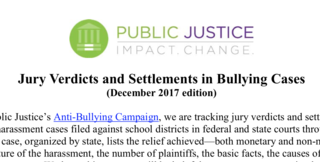Bullying
Should You Sue Your Child's School Over Bullying?
Why you should avoid bullying lawsuits like the plague.
Posted June 13, 2020

Has your child been bullied for a long time despite your repeated complaints to the school? If so, you may be considering legal action. Bullying lawsuits against schools have become increasingly common, and you may have heard experts recommending them if all else fails. You may have also read about plaintiffs winning large monetary awards, even in the millions of dollars. Therefore, it may seem like the prudent way for you to go.
So, should you? You definitely should, if your goal is to help lawyers make a living. Lawyers are also people with bills to pay and mouths to feed. However, if you are concerned with the welfare of your child and your family, avoid lawsuits like the plague.
This recommendation does not apply if your child’s school is guilty of criminal behavior. If a staff member has committed acts like physical assault and battery, sexual abuse, intentional psychological torture, theft or vandalism, legal action may certainly be warranted. But typically when children are being bullied, what is happening is that other students are insulting them, spreading nasty rumors about them, writing mean stuff about them in cyberspace, excluding them from social groups and activities, taking their possessions to annoy them, or shoving and hitting them without causing injury. Even when bullied children get seriously attacked physically, it may have been after the school was informed, and then got involved trying to put a stop to the bullying by investigating, judging, and punishing the alleged bullies. While being a victim of daily bullying by peers can make a child absolutely miserable and even cause long-term physical and emotional damage, initiating legal action against the school could make your current situation seem like a picnic.
Once you file a lawsuit against the school for failing to stop your child from being bullied by their fellow students, most or all of the following could happen.
- Unless you can find a lawyer to take your case pro bono or on contingency, you will spend substantial amounts of money.
- The school and district will get their lawyers to fight you. In the process, they may try to make you look like the bad guy. This could include looking for dirt on your family and trying to blame the bullying on your deficient parenting. They would do this not necessarily because they are evil, but because it is the normal thing for human beings to do when they are defendants in lawsuits.
- Few people like having their children accused of being bullies, so the parents of the alleged bullies are likely to despise you and fight back, blaming you and your child for the situation.
- The lawsuit will consume your life. You and your family could lose many nights of sleep and be anxiety-ridden in the daytime. As a result, your health may suffer. If you and your spouse don’t fully agree on the course of action, your marriage can be undermined, too.
- Any goodwill you may have garnered among school staff over the years may immediately evaporate, for now, you have declared war against them. The specific staff members you will be implicating will likely be especially furious with you and try to turn others against you, too.
- News of your action will spread throughout the community. Most people relish gossip. They may embellish the negative stories and even invent some new ones.
- Your child’s social situation could sharply deteriorate, as the accused bullies look for subtle and not-so-subtle ways to get even.
- If you enroll your child in a new school, there is a good chance they become a victim of bullying there as well. It is not uncommon for certain kids to be bullied in every school they attend. And if the students get wind of the lawsuit against the old school, they are likely to bring it up with your child. If your child responds by getting angry or defensive, the kids may continue to torment them. You may contemplate suing the new school, too. There are, indeed, parents who have targeted more than one school in their lawsuit.
- The staff of the new school will probably know about your lawsuit against the previous school, so they may be apprehensive. They may walk on eggshells with you, which will make you uncomfortable with each other. Or they may be quick to point out problems with your child in order to preempt any complaints you may bring. You may counter by blaming them and putting them in the same basket as the old school. But even if the school goes out of its way to protect your child from bullies and to reprimand them, it may be unwittingly fanning the flames of hostility against your child.
- If your child becomes miserable in a new school, you may decide on homeschooling as the only option. This may additionally stress your family, especially if you need to give up a paying job in order to teach at home.
- If you do win the lawsuit and receive a monetary reward, you would hope that it would come from the pockets of the parents of the bullies, or from the school staff who failed to protect your child. But it won’t. It will come from taxpayer money. In other words, the rest of us will have been punished. Will that knowledge make you feel justice was served?
- After your victory, you and your child may still remain clueless as to what caused the bullying in the first place or how to prevent it in the future.
- If you lose the lawsuit, you may work even harder* to convince yourself that your child was perfect, that the school was negligent, that the system is unjust, and that you did the right thing by suing it. You will rail at any psychological professionals who suggest that bullied children can be taught how to solve their problems on their own.
For a deeper understanding of these ideas, read the book about workplace mobbing by Janice Harper and watch the fictional Netflix series, 13 Reasons Why.
*The book, Mistakes Were Made (but Not by Me): Why We Justify Foolish Beliefs, Bad Decisions, and Hurtful Acts, by Carol Tavris and Elliot Aronson, offers a brilliant exposition of this phenomenon.


